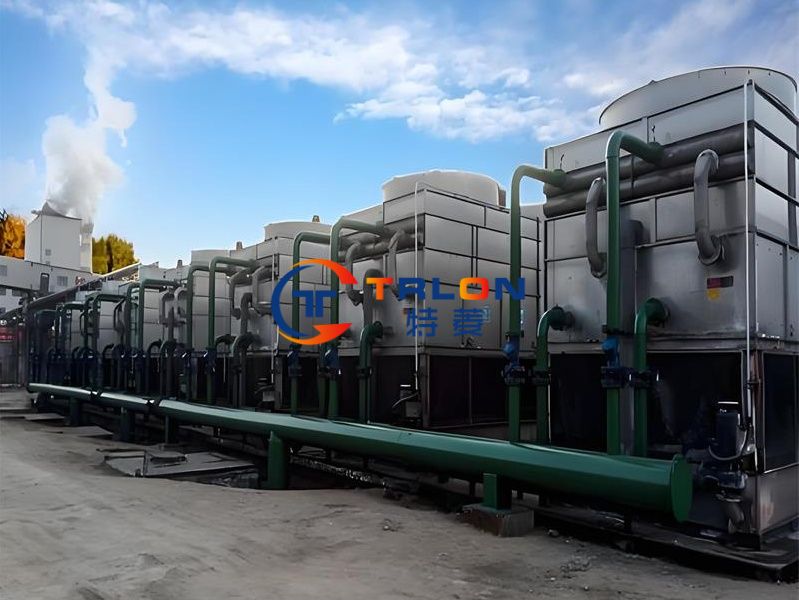
A cross-flow cooling tower is a common cooling equipment, mainly used for cooling circulating water in industrial and commercial facilities. Its working principle is to use the continuous flow of water in the tower's filling material to exchange heat with the air, dissipating the heat in the water into the air to achieve the purpose of cooling.
The characteristics of the cross-flow cooling tower lie in its filling material design, which allows the water to flow horizontally in the filling material, forming a maximized heat exchange area with the vertically flowing air. This design makes the cooling effect more significant and ensures more even water distribution. In addition, cross-flow cooling towers usually adopt natural ventilation, using natural wind to drive air flow, thus having a lower operating cost and easier maintenance.
In practical applications, cross-flow cooling towers are commonly used for the discharge of large amounts of heat generated in various industrial production processes, such as power plants, chemical factories, and steel mills. Moreover, they are also widely used in air conditioning systems, refrigeration and cold storage, and other fields.
Compared with other types of cooling towers, the cross-flow cooling tower has the advantages of simple structure, stable operation, and convenient maintenance. Its disadvantages include a large footprint and limited processing capacity for high-temperature and high-pressure conditions.
In summary, the cross-flow cooling tower is an efficient and practical cooling equipment, widely used in various industrial and commercial facilities. With the continuous advancement of technology and the increasing demand for application, the performance and efficiency of cross-flow cooling towers will be further improved in the future.
The difference between cross flow cooling towers and counter flow cooling towers
The so-called cross-flow cooling tower is a cooling tower that allows air to flow horizontally through the water-sprayed filler, the water dragon falls vertically from the top of the tower, and finally allows the water flow and airflow to meet head-on to achieve a cooling effect. Counterflow cooling towers and cross-flow cooling towers are two of our most common cooling towers. There are many similarities between these two types of cooling towers, and this article mainly makes a brief analysis of the differences between the two cooling towers. For many people who know about cooling towers, the main difference between cross-flow cooling towers and counter-flow cooling towers is the cost, principle, maintenance and cost.
1. In the HIGH RANGE, that is, the temperature difference between hot water and cold water exceeds 18 degrees, because the hot water should reduce the temperature by more than 18 degrees in a short period of time, there must be sufficient time to contact the packing air, so the packing should be very high. (Actually equivalent to secondary and tertiary cooldowns)
Since the wind and water of the cross-flow tower flow in the direction of cross-flow, the resistance is only related to the diameter and not the height, so it can be theoretically very high. The packing of the counterflow tower cannot be very high, and wind and water convection generally reach more than 1.5M, which may cause air resistance. For example, in steel mills, color coating and galvanizing cooling, in rubber factories, hot water needs to be reduced from 55 degrees to 35 degrees or lower, and cross-flow towers can be used.
The water tower made of SKS steel has a packing height of 5.5M and a cooling temperature difference of 25 degrees; For the papermaking process of APP Sinar Mas Group, 4000T/H single CELL cross-flow tower is adopted, and the packing height is 15M;
2. In the case of sewage, the cross-flow tower can be filled with grid packing, and can be easily cleaned at any time without stopping the machine; Although the counterflow tower can use grid filling, there is a problem in cleaning, and in actual engineering, sewage is often accompanied by high temperature, so the cross-flow tower can be two-pronged.
Article Address:https://www.trlen.com/baike/727.html
Guangdong Trlon Energy-saving Air Conditioning Equipment Co., Ltd.
Contact:Mr. Wang
Free Hotline:4008-8383-95
Company Email:sales@trlon.com
Web Site:https://www.trlen.com/
Company Address: 1916A, Block A, David Donglong Business Building, Longhua, Longhua District, Shenzhen